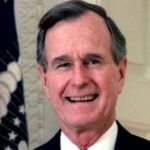 Weird Stuff
Weird Stuff  Weird Stuff
Weird Stuff  Movies and TV
Movies and TV 10 Actors Who Almost Didn’t Take Career-Defining Roles
 Technology
Technology 10 Little-Known Shifts in Computer Science
 Religion
Religion 10 Catholic Histories That Reveal Acceptance of Abortion and Contraception
 Politics
Politics 10 Lesser-Known “First and Only” Facts about U.S. Presidents
 Miscellaneous
Miscellaneous 10 Things You May Not Know about the Fourth of July
 History
History 10 Shocking and Gruesome Founding Father Facts They Don’t Teach in School
 Crime
Crime The Ten Most Vicious Los Angeles Killers
 Miscellaneous
Miscellaneous 10 Indispensable Corporations the World Cannot Afford to Lose
 Animals
Animals 10 Unusual Wolves That Made The News
 Weird Stuff
Weird Stuff Ten Unexpected Discoveries Involving Vomit
 Movies and TV
Movies and TV 10 Actors Who Almost Didn’t Take Career-Defining Roles
 Technology
Technology 10 Little-Known Shifts in Computer Science
Who's Behind Listverse?

Jamie Frater
Head Editor
Jamie founded Listverse due to an insatiable desire to share fascinating, obscure, and bizarre facts. He has been a guest speaker on numerous national radio and television stations and is a five time published author.
More About Us Religion
Religion 10 Catholic Histories That Reveal Acceptance of Abortion and Contraception
 Politics
Politics 10 Lesser-Known “First and Only” Facts about U.S. Presidents
 Miscellaneous
Miscellaneous 10 Things You May Not Know about the Fourth of July
 History
History 10 Shocking and Gruesome Founding Father Facts They Don’t Teach in School
 Crime
Crime The Ten Most Vicious Los Angeles Killers
 Miscellaneous
Miscellaneous 10 Indispensable Corporations the World Cannot Afford to Lose
 Animals
Animals 10 Unusual Wolves That Made The News
10 Bush-Bin Laden Connections That Raised a Few Eyebrows
When the name bin Laden is mentioned today, the first thing that comes to most people’s minds would be terrorism—particularly against the United States. Similarly, George Bush (the father or the son) evokes images of each man’s time as president of the United States. In the case of George W. Bush, his time in the White House came during the 9/11 attacks.
However, there are many connections other than the obvious one mentioned above. The Bush and bin Laden families have a long history of business dealings, while Osama himself apparently did a complete about-face, as he once collected his paycheck from the CIA, working on behalf of the United States and their interests. While some of the following links between the Bushes and the bin Ladens are likely to be mere coincidences, they are intriguing, to say the very least. Here are ten examples of connections, be they direct or through mutual associates, between two of the most famous families on the planet.
10 Oil Business Connections

The connections between the bin Laden and Bush families go back decades. Perhaps the first time of note that their paths crossed would be in 1978, when George W. Bush and Salem bin Laden (brother of Osama) set up Arbusto Energy in Texas.[1]
The business was far from a success, however, and by the mid-1980s, it (having since merged with Spectrum 7) was taken over by a company called Harken Energy. As we will see a little later on, this takeover raised suspicions in itself—suspicions that would be proven correct when examination of the company underwriting the takeover to the tune of millions of dollars exposed various corruption scandals.
There were other wealthy Saudi investors connected to Arbusto. The person largely seen as being responsible for many introductions between the Bush family and these wealthy investors is our next entry on this list.
9 Jim Bath

Jim Bath was seen as a “CIA asset” around the same time that Bush Jr. was venturing into the oil business (at a time when the CIA was under the direction of Bush Sr.).[2] He also had connections going in all directions outside the United States, particularly with rich Middle Eastern businessmen looking for opportunities with the American dollar. Many of these were members of the royal family and rich class of Saudi Arabia, including the bin Ladens.
In fact, so deep was the trust between Bath and the bin Laden family that Bath had entered into an agreement with them to be their representative for business ventures in America. This agreement would also lead to Bath representing the interests of Khalid bin Mahfuiz, a person whose name comes up time and again in connection to Bush and bin Laden’s business ventures and someone deeply connected to the National Commercial Bank of the Saudi royal family.
Bath had been close friends with Bush Jr. since their time together at the Texas Air National Guard—a placement that, rightly or wrongly, would keep an otherwise eligible Bush Jr. out of the Vietnam War.
8 BCCI and Harken Energy
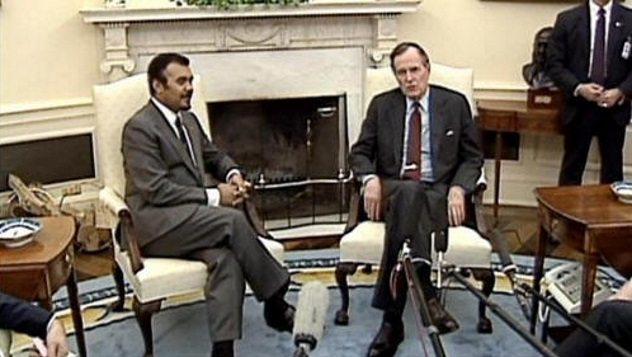
When Harken Energy took over the collapsed Arbusto Oil Company in 1986, it was underwritten for $25 million by the Bank of Credit and Commerce International, better known as BCCI. Coincidentally or not, BCCI also had many of the same rich Middle Eastern businessmen involved in its operations as Arbusto had.
In early 1991, the BCCI was shut down due to investigations revealing money laundering activities that were connected to the movement of weapons, as well as “funneling money to the Mujahideen” to aid in their conflict against the Soviet Union. (As we shall see later, this money was essentially being funneled to Osama bin Laden.) Another longtime Bush–bin Laden associate, the previously mentioned Khalid bin Mahfuiz, had a controlling interest in BCCI. In short, BCCI has been called “the most corrupt financial institution in history.”[3]
Although there were no proven direct links between the Bush family and BCCI, there were definite indirect links to be investigated. There were also similar connections between another group the Bush and bin Laden families were involved with, which was directly involved with the BCCI, and it is the next entry on our list.
7 The Carlyle Group
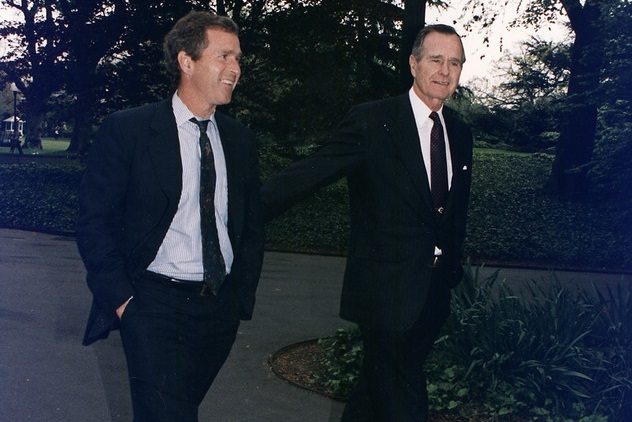
In the book House of Bush, House of Saud, researcher and writer Craig Unger explored accusations of secret political agendas between the Bush family (and, in turn, the Bush administrations), several rich Saudi businessmen (including Saudi royals and bin Laden), and a gathering of specific people known as the Carlyle Group. To say the content of the publication was explosive would be an understatement, with some publishing houses suddenly pulling the book from their available titles due to increasing risks of libel.
Needless to say, many people viewed this as an attempt to threaten such publishers and writers to suppress information. One of the publishers, Simon Master of Random House, would even claim that libel lawyers were “stifling free speech.”[4] To others, it wasn’t the lawyers doing the stifling but rather those who were the subject of such book’s content.
In short, the Carlyle Group, while being a fully transparent private equity company, had many of the same Saudi businessmen and Bush Jr. and his associates, who were connected to the highly questionable aforementioned BCCI scandals, as well as various other companies stretching back years. Perhaps because of this, they are viewed by some with suspicion. Our next entry does nothing to temper that suspicion.
6 Bush Sr.’s 9/11 Meeting
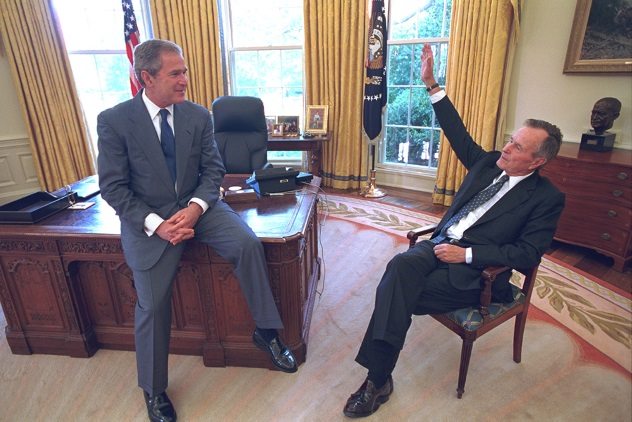
While George W. Bush was reading a book about goats in a school in Florida at the time the 9/11 attacks were unfolding, George H. W. Bush was involved in a meeting representing the aforementioned Carlyle Group in Washington, DC, at the Ritz-Carlton Hotel, and he was with one of the brothers of America’s soon-to-be most wanted man, Osama bin Laden.[5]
Whether or not the meeting was purely coincidence or not is up for debate—and many have done just that. In his film Fahrenheit 9/11, Michael Moore, for example, would cite these links between the two families, not least the meeting on September 11. While both families insist the relationship between the Bushes and the bin Ladens is purely down to business interests, others believe it to have a covert political agenda.
So, while it doesn’t prove anything untoward in its own right, it is perhaps a coincidence too far, even for the most ardent skeptic to such conspiracy notions, maybe even more so, given the actions and details of the next entry on our list.
5 Bin Ladens Allowed to Leave the U.S.

It is certainly no secret that in the aftermath of the Twin Tower attacks, prominent members of the bin Laden family were allowed to leave the United States.[6] Not only that but they were given safe passage courtesy of the U.S. government at a time when every aircraft over U.S. airspace was otherwise grounded.
Although it’s easy to jump straight on the conspiracy train with this one, when viewed clinically, it would most likely be a case of protecting longtime associates from the unjust attacks they would likely experience due to their relative having committed a terrible atrocity. As one of Osama’s brothers, Yeslam bin Laden, stated, since the 9/11 attacks, “the name bin Laden is synonymous with terror.”
It wasn’t just the fact that bin Laden’s family members were allowed to leave, though. Many reports would eventually surface from various military and government officials that Osama bin Laden could have been caught soon after 9/11. Perhaps most notably, CIA field commander Gary Berntsen claimed there was a distinct lack of foot soldiers and effort to hunt down and capture bin Laden, despite his location apparently being known in the immediate months following the attacks. Berntsen talks extensively about this in his book Jawbreaker, in which he ultimately states that the United States “let Osama bin Laden get away.” Of course, whether bin Laden was “taken out,” as the world was told in 2011, is a conspiracy in itself. While interesting, it is not one that we will look into here.
4 Osama’s CIA Connections
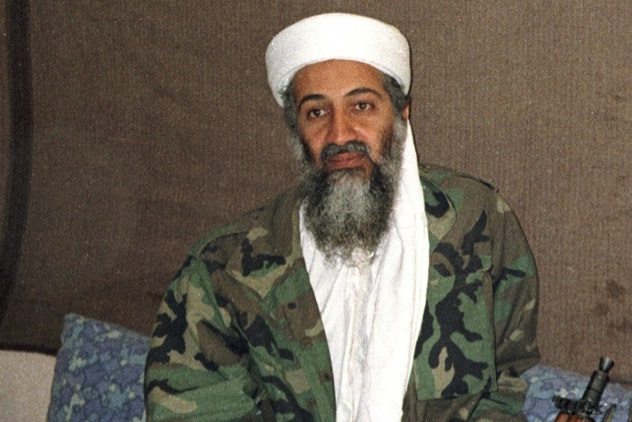
Of course, in the 1970s and predominantly in the 1980s, Osama bin Laden was not only considered friendly to the United States; he was considered to be a CIA asset.[7]
While most of the bin Laden family were astute and successful businessmen, Osama’s talents were seemingly more hands-on and best applied “in the field.” During the 1980s, Osama led militia groups against the Soviet Union in Afghanistan. His group was essentially armed, trained, and backed by the CIA.
Once that conflict was over is where things begin to get murky. Many conspiracy theorists contend that Osama bin Laden maintained his links to the CIA, although in a more covert way. It should be noted there is no absolute proof of this, with many of the people making these claims using past CIA actions to back up their current theories.
Officially, Osama bin Laden believed the U.S. influence in the Middle East was too great, and he eventually left his native country and began on the road that would ultimately lead to the 9/11 attacks. This type of action in intelligence circles is called “blowback.” Perhaps the fact that such actions are common enough for intelligence agencies to have a name for them should be telling in itself.
3 9/11 and Saudi Arabia
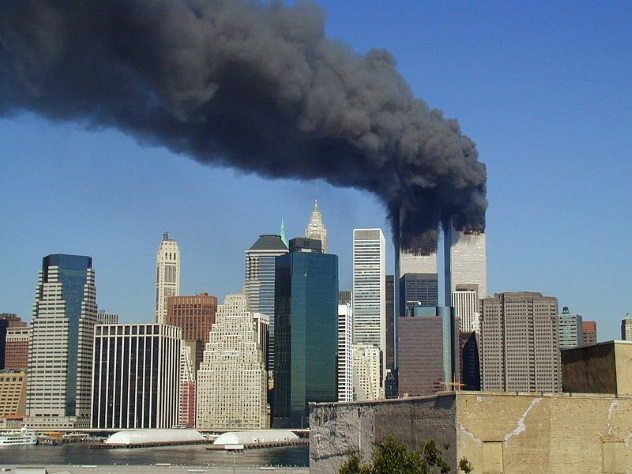
Although there is indeed a lot of murkiness surrounding just about every aspect of the 9/11 attacks, another “coincidence” was an apparent Saudi involvement in the attacks.[8] Of course, Saudi Arabia is the bin Ladens’ home country, to boot.
Official records state that of the 19 hijackers involved in the 9/11 incident, 15 of them were Saudi Arabian. Also, the alleged mastermind, Khalid Shaykh Mohammed, was free to travel in and out of the United States throughout much of 2001. This was despite alleged warnings to the Bush administration from their own intelligence services of his suspected involvement in terrorist activity. Further warnings were issued only weeks before the attacks, in August 2001, even mentioning Osama bin Laden and other Saudi sponsors.
It is strange, then, at least to some people’s reckoning, that the U.S. military didn’t immediately turn their attention to Saudi Arabia. Instead, they opted to invade Afghanistan. Officially, they claimed this to be the place Osama bin Laden was residing. We examine the possible “other” reasons why in the next entries on our list.
2The Afghan Pipeline
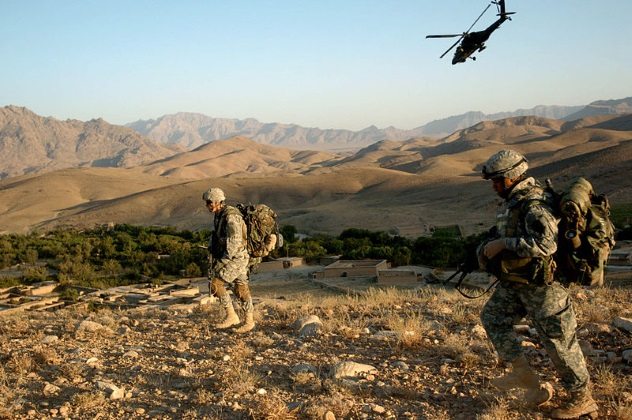
In 1997, California company Unocal (which had numerous past connections to Dick Cheney) began preparations for the Afghanistan Oil Pipeline, which would run from Turkmenistan, through Afghanistan, and to the Arabian Sea (and into the hands of US-run corporations). Both the Taliban and anti-Taliban groups supported the deal—so much so that U.S.-led training was provided to potential workers to assist in laying the pipeline.
However, many activist groups, particularly feminist groups, intensely protested any project involving the Taliban due to their genuinely horrendous stance on human rights, particularly the lack of rights for women. The pressure proved too much, and Unocal was forced to pull out of the deal.
After the 9/11 attacks (which now made Osama bin Laden public enemy number one), the Bush administration would bomb key locations in Afghanistan, eventually invading the country to track down their culprit. Coincidentally or not, by the end of 2002 (with the aforementioned Dick Cheney high up in the Bush administration), the pipeline deal was back on. With the Taliban now the enemy, their approval was no longer needed.[9]
Whether these events were manipulated, taken advantage of, or merely coincidental, so many researchers and critics have highlighted them in numerous books and writings that they really shouldn’t be ignored completely.
1 Heroin
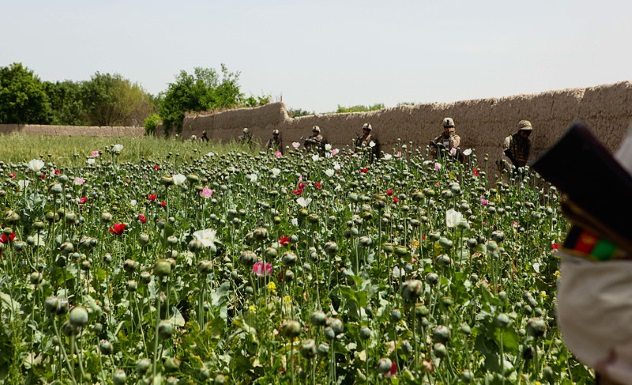
Perhaps one of the most overlooked aspects of the Bush–bin Laden connection is the drug trafficking accusations following the invasion of Afghanistan, claims that have hounded the Bush family in particular for decades (and many would suggest rightly so).[10]
Whereas the Taliban had expressed support for the aforementioned pipeline, they weren’t so supportive and, in fact, were completely against the producing and trafficking of heroin from the vast supplies of opium in the country. While the CIA, and, in turn, other intelligence agencies, would look the other way and essentially allow the opium trade to flourish, the Taliban were actively attempting to shut down such activities.
When U.S. forces entered Afghanistan, accusing the Taliban of providing a haven to Osama bin Laden, some noted how heroin production not only returned to pre-Taliban times but positively exploded to an all-time high. Perhaps it was purely coincidence, then, that these opium fields had been seized by the U.S. military shortly after the invasion and remained in their control in the years following?
Read more about 9/11 and Al-Qaeda on 10 Heroic Police Officers Who Gave Their Lives on 9/11 and 10 Totally Crazy Facts About Al-Qaeda.



